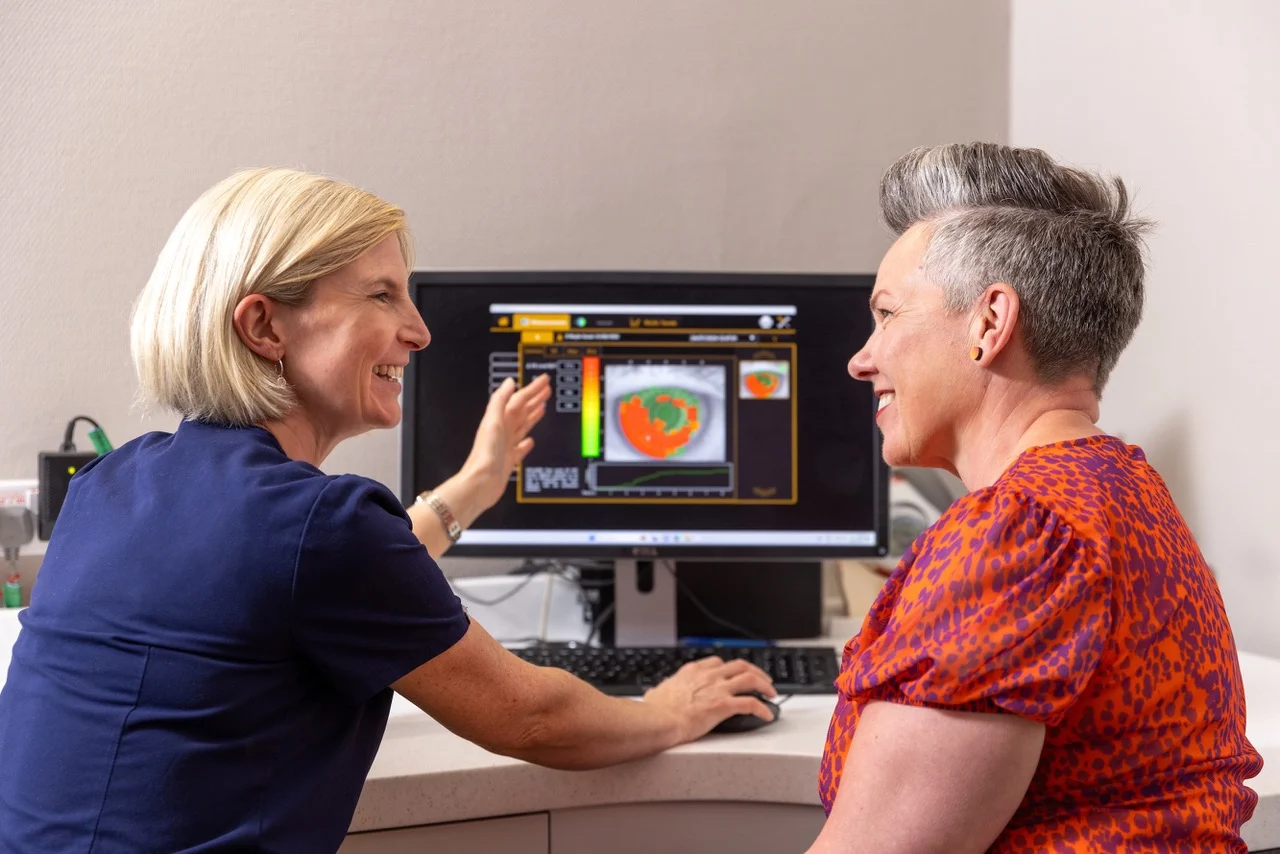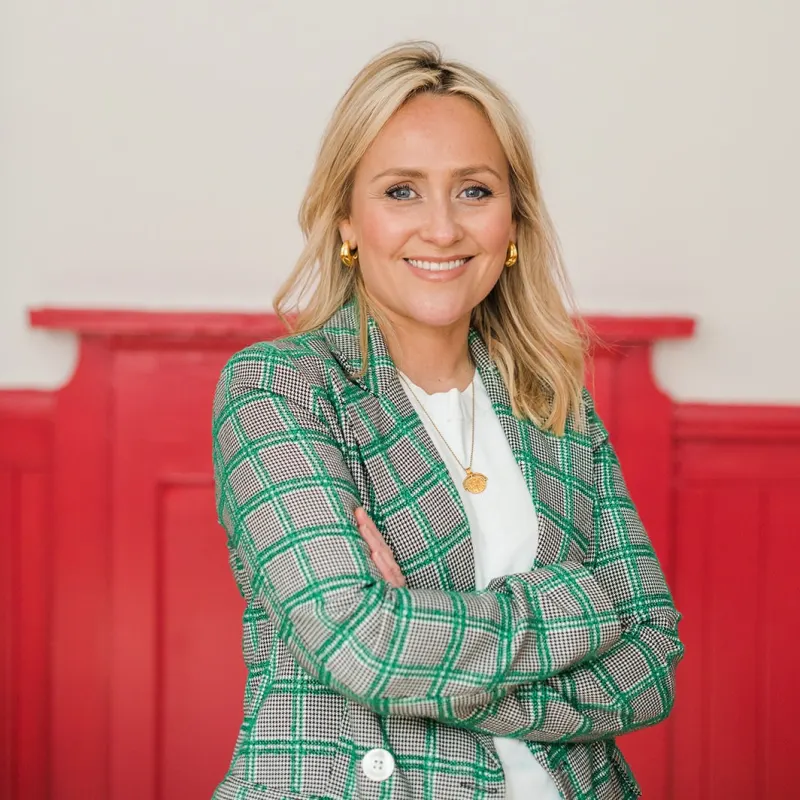Did you know that around 61% of perimenopausal and menopausal women experience dry eye syndrome? That’s a significant number!
So, what’s going on? During menopause, levels of estrogen, progesterone and androgens drop, which affects the glands in our eyelids. This hormonal shift disrupts the composition of the tear film - the delicate layer that keeps our eyes moist and comfortable. As a result, the eyes can produce fewer tears or tears of poorer quality.
Dry eye, also known as ocular surface disease, can feel different for everyone. For some, it’s dry, tired eyes. For others, it’s a gritty, burning or stinging sensation, or even eyes that are constantly watery. Vision may blur throughout the day and contact lenses can become horribly uncomfortable. It can feel unrelenting.
While menopause is a major factor, it’s far from the only one. Laser eye surgery, certain medications like antihistamines and beta blockers, smoking, wearing contact lenses, exposure to dry environments, and conditions like allergies, blepharitis (including demodex), thyroid eye disease, arthritis, and Sjogren’s syndrome can all contribute to dry eye symptoms. But just because it's common doesn’t mean we should suffer through it.
A fresh approach in Edinburgh
egg partner Cameron Optometry in Stockbridge is home to Edinburgh’s only dedicated Tear Clinic, a first-of-its-kind service offering specialist treatments that aren’t widely available elsewhere. It’s open to both existing patients and those who already see another optometrist or optician but are looking for more targeted support.
We caught up with their optometrist Gillian Bruce, to hear her story and learn more about the clinic’s mission.

Okay, let’s start from the beginning. Tell us about you.
I’m originally from Dundee and studied at Glasgow Caledonian University. I returned to Dundee to start my career with a fantastic family-run practice, where I stayed for 10 years. After a round-the-world solo trip, I joined Cameron Optometry. 14 years later, I’m still here! Since then, I’ve qualified in independent prescribing, completed a Master’s in primary care ophthalmology, launched a myopia management clinic, and now, the Tear Clinic. Outside work, I’m a mum to two energetic kids, Matthew and Eva. When I get a moment to myself, I love playing tennis.
Why optometry?
I always enjoyed maths and science, and I wanted a job where I could work with people. I considered physiotherapy, but my science teacher suggested I apply for optometry too. A twist of fate (and a tricky biology exam!) led me down this path. I’ve never looked back.
What do you love most about your job?
It’s incredibly rewarding. Every day I get to help people, sometimes in life-changing ways, like fitting hospital-grade contact lenses or resolving chronic discomfort. It's a privilege to make a real difference in someone's quality of life.
Why does eye health matter?
Vision is the sense people fear losing most and it’s easy to understand why. Good vision and comfortable eyes are deeply connected to our quality of life. Unlike teeth, eyes can’t be replaced. Taking care of them early means protecting your ability to live independently and enjoy life fully.
Regular eye exams are about more than just updating your glasses. They can detect underlying health issues including high blood pressure, diabetes, autoimmune diseases and neurological conditions sometimes before you notice any other symptoms. The eyes really are a window into the body.
What are some common eye care myths?
Oh, there are a lot of them! Here's some for starters...
“Wearing glasses really make your eyesight worse.”
We actually see with our brain, our eyes are just the messengers, so when we get used to seeing clearly with our glasses it feels as if our vision gets much worse without them but no, wearing glasses can’t make your eyesight worse!
“Children can’t wear contact lenses until they are teenagers.”
There is good evidence to show that children are far more compliant with their contact lens care regimens than adults! We also know that years of contact lens wear as a child does not impact on your eye health as an adult. I’m a strong believer that for some children contact lenses can very much improve quality of life in so many ways, for example for sport and self-confidence.
“You can damage your eyes by reading too much.”
So, you can tire them on a short-term basis but that won't cause any permanent decline. Good lighting, good screen positioning and the correct vision correction will help avoid eye strain.
“Watching TV will make your eyes go square.”
I remember when we used to advise children not to spend too much time in front of a TV. Now I actively tell them that a TV is better than a tablet or phone! This really stems from the fact that far more children are short-sighted (myopic) now than ever before, and evidence shows us that less time spent outdoors, and more intense close work is likely to blame.
“Dry eyes and dry macular degeneration must be the same thing.”
Definitely not. Dry macular degeneration affects your vision, and dry eyes affect your comfort. Dry macular degeneration is the most common form of macular degeneration, an eye condition that slowly affects your central vision and is typically seen in older patients.

Tell us about the Tear Clinic.
The Tear Clinic in Edinburgh is designed for people who’ve been struggling with dry or watery eyes, often for years. It's not about vision correction; it's about relief and comfort. Many people have mild symptoms that are manageable through routine care, but for others, the problem is complex and needs specialised attention. Long waits for hospital appointments or limited support elsewhere can leave patients frustrated and without answers.
This clinic offers a fresh start. Whether you’ve had to give up contact lenses, stopped wearing eye makeup, or just feel like your eyes are always bothering you, the clinic aims to find solutions.
Who would benefit from going to The Tear Clinic?
If you've been dealing with symptoms including dryness, irritation, burning, itching, redness, watery eyes, sticky eyelids, swelling, light sensitivity, or blurry vision, you could benefit from a consultation. Even if you've already tried treatments elsewhere, this could be the place that finally helps. Every treatment plan is customised to suit individual concerns.
Is it just one visit?
The Tear Clinic initial consultation generates a patient report that includes a diagnosis and management plan. This is really important as all too often patients have been passed from one place to another without actually knowing what condition they have or why. Most patients will need a follow up appointment to ensure the success of any treatments put in place, or to tweak the management plan if required.
Treating dry eye successfully is about finding the treatment, or combination of treatments to suit you. To book an appointment, call 0131 225 2235 or email [email protected]. The Tear Clinic is based within egg partner Cameron Optometry. Find out more at cameronoptom.com.
Cameron Optometry offer egg members 20% off independent brands including Anne & Valentin, Theo, Lindberg, Feb31st, Cutler & Gross and Kirk & Kirk. Please show your redemption email when you arrive.







